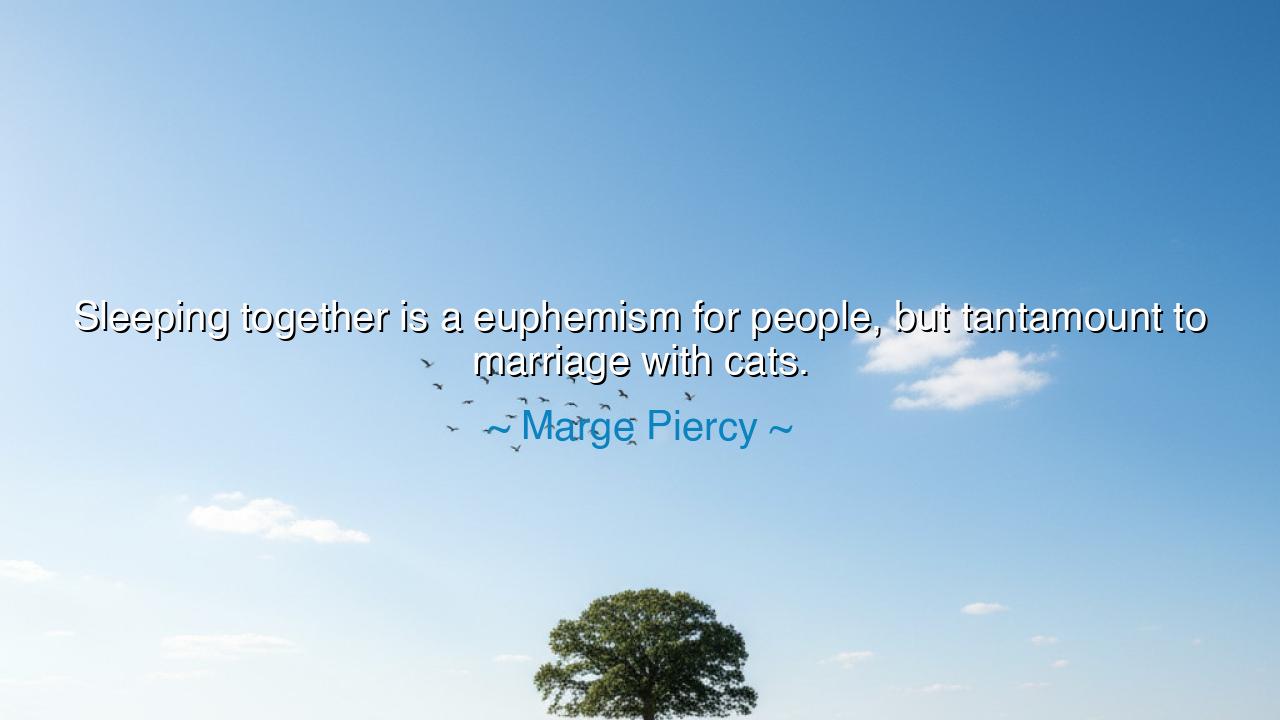
Sleeping together is a euphemism for people, but tantamount to






When Marge Piercy wrote, “Sleeping together is a euphemism for people, but tantamount to marriage with cats,” she spoke not merely with wit, but with the deep intuition of one who understood the subtle hierarchies of love, companionship, and loyalty. Beneath the humor lies a profound observation about the difference between physical intimacy and true connection, about what binds souls together—not through desire alone, but through daily companionship, presence, and shared trust. To Piercy, the phrase “sleeping together,” so often used to describe fleeting human passion, pales in comparison to the quiet, steadfast bond that forms between a human and a cat—the intimacy not of possession, but of coexistence.
The meaning of her words unfolds like a parable. Among humans, “sleeping together” is often spoken as a euphemism, a polite veil over the primal act of physical union. Yet, in truth, it does not always signify love or commitment. It can be fleeting, transactional, even hollow. But to “sleep together” in the way one does with a cat is something else entirely—it is to share one’s space, one’s rhythm of rest, one’s very vulnerability. A cat does not sleep beside one out of duty or desire; it does so out of deep trust. To earn that trust takes time, gentleness, and respect. Thus, Piercy’s comparison is not trivial—it is sacred in its simplicity. Where humans often rush to intimacy through desire, animals arrive at it only through faith.
Piercy, a poet and novelist deeply attuned to the themes of independence, feminism, and emotional honesty, often explored the tension between freedom and connection. Her words here carry that same duality. She reminds us that human relationships, for all their grand declarations, often struggle to maintain the quiet intimacy that animals offer so naturally. The cat, self-possessed yet affectionate, mirrors the kind of love Piercy believed in: one not of dominance or dependence, but of mutual respect and voluntary closeness. In her eyes, the bond with a cat embodies what marriage ideally should be—a companionship freely chosen, nurtured by patience, and sustained by quiet understanding rather than constant demand.
Throughout history, poets and sages have sought to define the nature of true companionship. The ancient Greeks, in their wisdom, divided love into many kinds—eros, the passionate fire of desire, and philia, the gentle warmth of friendship. What Piercy suggests is that modern love has too often confused one for the other. “Sleeping together” as people may signify eros, but sharing life in harmony, as one does with a cat, represents philia—the love that endures beyond passion. The former burns quickly; the latter glows eternally. Thus, her observation is both humorous and tragic: that humans, for all their cleverness, still have much to learn about tenderness from the quiet creatures who curl beside them in the dark.
Consider, for example, the story of Ernest Hemingway, whose love for his cats was legendary. In his home in Key West, he surrounded himself with dozens of them—each one a companion, each one trusted to roam freely through his sanctuary. He once said that no animal had ever given him more peace than a cat asleep at his feet. Hemingway, a man of war and wildness, found in those small creatures a lesson in domestic serenity. Their trust was not bought, nor easily earned; it was a reflection of his stillness, his patience, his humanity. Like Piercy, he understood that to share rest with another being—human or feline—is the truest test of comfort and affection.
The lesson in Piercy’s quote is both subtle and profound: that intimacy without trust is hollow, and that love, whether between humans or animals, must be built on mutual respect and ease. The physical act of closeness means little if the spirit is uneasy. The wise soul learns that the deepest bonds are not forged in passion’s fire, but in the soft light of quiet companionship. To “sleep together” in the truest sense is to rest side by side without fear, to share silence as easily as laughter, to belong without binding. In this, cats become teachers, reminding us that love is not possession but presence.
So, my child, remember the wisdom within Marge Piercy’s playful words. Do not mistake intensity for intimacy, nor passion for peace. Seek relationships that feel like sleeping beside a cat—calm, trusting, undemanding, and mutual. Let your love be like the cat’s gaze—steady but free, curious yet content. For in that gentle, wordless companionship lies the secret the ancients knew: that love is not noise or conquest, but the simple grace of two beings who, without force or pretense, choose to share their quiet. And in that choice—again and again, night after night—love becomes not a euphemism, but a way of life.






AAdministratorAdministrator
Welcome, honored guests. Please leave a comment, we will respond soon